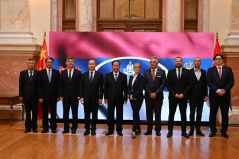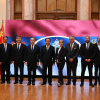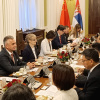The fifth meeting of the Mixed Commission of the National Assembly and the Standing Committee of the National People's Congress of the People's Republic of China was held today in Belgrade.
The co-chairs of the Mixed Commission, Marina Ragus, Deputy Speaker of the National Assembly, Chairperson of the Foreign Affairs Committee and Head of the PFG with China, and Peng Qinghua, Vice Chairman of the Standing Committee of the National People's Congress, assessed that the political relations, which have reached the level of strategic cooperation, provide a new direction for the improvement of the overall relations between the two countries. Ragus congratulated the Chinese people on the 80th anniversary of the victory over fascism in World War II, in which both the Chinese and Serbian peoples made great sacrifices. She assessed that this model of the interparliamentary commission represents the highest form of cooperation the National Assembly knows in cooperation with other parliaments and represents a natural result of the traditional closeness, steely friendship and mutual support of the two countries and two peoples, and co-chair Peng emphasised that the work of this commission will make a new contribution to the improvement of the overall cooperation and friendship, as recognised by the presidents of both countries.
In the working part of the meeting, the members of the Mixed Commission discussed topics of mutual interest, primarily bilateral relations and parliamentary exchanges, improving the legal basis for bilateral cooperation, promoting people-to-people and youth exchanges in order to popularize the concept of the China-Serbia Community with a Shared Future in China and Serbia, promoting historical perspectives on World War II and maintaining genuine multilateralism, and experiences in legislation regarding the preservation of national security, combating sanctions and interference in internal affairs.
The co-chairs of the Mixed Commission, Ragus and Peng, exchanged opinions and positions on bilateral relations and parliamentary exchanges. Ragus emphasised that thanks to parliamentary diplomacy and its potential, it is possible to gain insight into the strength and complexity of the political organisation of contemporary China. She emphasised that, in the last year alone, cooperation and parliamentary contacts have been intensive and fruitful, especially emphasising the activities of the PFG with China that were implemented in cooperation with the Embassy of the People's Republic of China in Serbia. Peng stressed that the relations between the two countries are recording a developmental leap and that they are based on the relationship established by the presidents of the two countries. He added that by strengthening strategic coordination, we are strengthening the political basis for a common future. The co-chairs jointly assessed that the friendly relations and the steely friendship between Serbia and China have passed the test of today's challenging geopolitical times. Peng added that the People's Republic of China supports Serbia in the preservation of its sovereignty and territorial integrity and legitimate interests regarding Kosovo-Metohija. He assessed that President Xi Jinping's Global Governance Initiative represents China's contribution to bringing stability to today's turbulent world, creating multilateralism and preserving international order, justice and law. He called for the synchronisation of development strategies with Serbia and further improvement of cooperation, especially in the areas of new technologies, innovation and education.
Dr Ugljesa Mrdic, Chairman of the Committee on the Judiciary, Public Administration and Local Self-Government and member of the PFG with China, and Zhang Yong, member of the Committee on Constitutional and Legislative Affairs of the National People's Congress, spoke about improving the legal basis for bilateral cooperation, focusing on key points related to the legislative framework of bilateral cooperation and the role that parliaments play in this process. The officials assessed that improving the legal framework is important both from the aspect of legal security and from the aspect of removing obstacles in other areas of cooperation between the two countries.
Aleksandar Markovic, Chairman of the Committee on Human and Minority Rights and Gender Equality and member of the PFG with China, and He Xin, Deputy Secretary-General of the Standing Committee of the National People's Congress and member of the Committee on Education, Science, Culture and Health, exchanged views on promoting people-to-people and youth exchanges in order to popularise the concept of the China-Serbia Community with a Shared Future in China and Serbia. The officials discussed this topic of mutual interest from the perspective of measures that Serbia and China are implementing to bring the two nations closer together. Markovic assessed that the common task is to promote exchanges and mutual learning, and that the exchange of people, studying, working and living in China and Serbia will enable a new level of close cooperation. Xin and Markovic emphasised cultural exchange, work and promotion of cultural centres, educational and scientific cooperation, as well as the promotion of tourism potential as a basis for improving the overall cooperation between the two nations.
Jovan Janjic, Deputy Speaker of the National Assembly, and Chai Fangguo, member of the Foreign Affairs Committee of the National People's Congress and Executive Vice President of the China-Serbia Legislative Cooperation Committee, discussed promoting correct historical views on World War II and maintaining genuine multilateralism. Janjic stressed that the aspiration and goal of the peoples who fought against fascism in World War II was not only the victory over the aggressor, but also the creation of an order based on multilateralism. He added that today, what is taking place on the world stage, is the erasure and falsification of historical facts on which this order was created. Also, the revision of history is at work, and therefore the culture of memory is an important element of the identity of the people and of national security, said Janjic. Chai Fangguo introduced his colleagues to the way in which the Chinese people preserve the memory of the victory in World War II by encouraging research and study of history, promoting a correct view of the war and opposing revisionism.
Aleksandar Mirkovic, member of the Foreign Affairs Committee and member of the PFG with China, and Zhang Yong, member of the Committee on Constitutional and Legislative Affairs of the National People's Congress, discussed experiences in legislation regarding the preservation of national security, the fight against sanctions and interference in internal affairs. Mirkovic stressed that Serbia completely rejects any interference in the internal affairs of sovereign states, as it itself has experienced the consequences of such a policy in its southern province. The case of Serbia is one of the most drastic examples of violations of international law and the principles on which the international order is based. He thanked the People's Republic of China for its principled position on the issue of Kosovo-Metohija and stressed that Serbia will continue to consistently support the sovereignty and territorial integrity of the People's Republic of China. Mirkovic added that Serbia responds to modern security risks by strengthening its security system and welcomed the expansion of cooperation with China in both military and security matters. Zhang Yong, member of the Committee on Constitutional and Legislative Affairs of the National People's Congress, introduced his colleagues to the legislative framework that protects China from the impact of sanctions and foreign interference in its internal affairs.
After exchanging views, the co-chairs of the Fifth Meeting of the Mixed Commission, Ragus and Peng, concluded that today's open and practical discussion is an indicator of the high level of trust between the two institutions and the two countries. The co-chairs agreed to continue to deepen cooperation through existing platforms and under the auspices of the two presidents in all areas of mutual interest. Ragus added that this type of cooperation will enable anticipation of events and preventive response and that, with President Xi's four global initiatives and the vision of Serbian President Vucic, Serbia and China will show that there is a successful model of cooperation and a model for a successful world.
The next, Sixth Meeting of the Mixed Commission will be held next year in Beijing.




